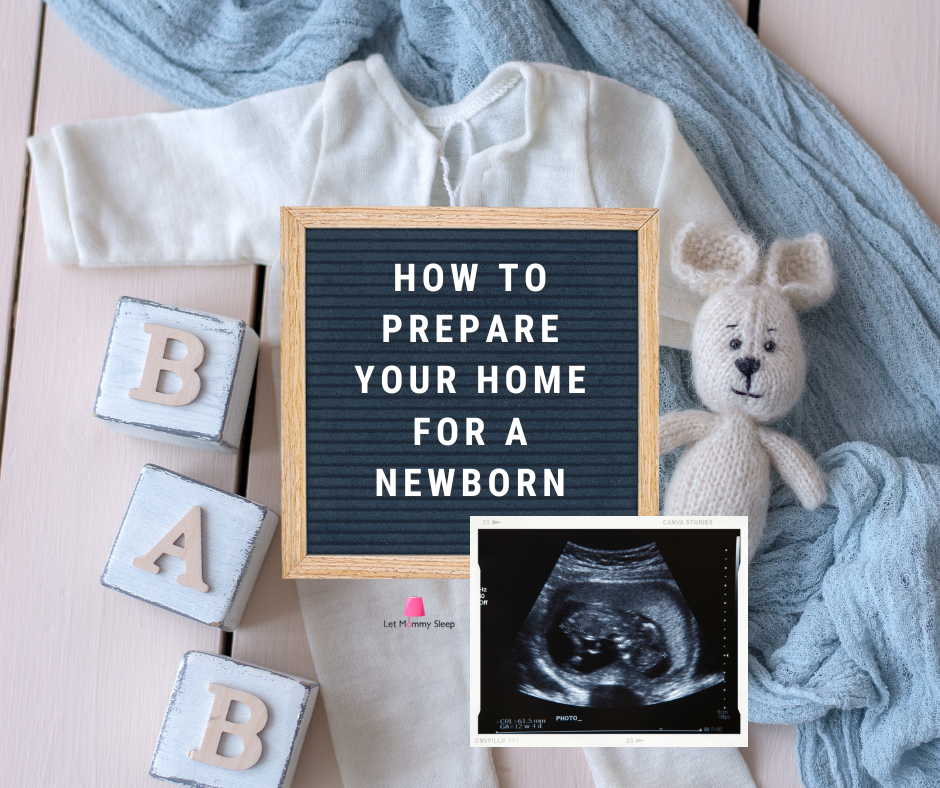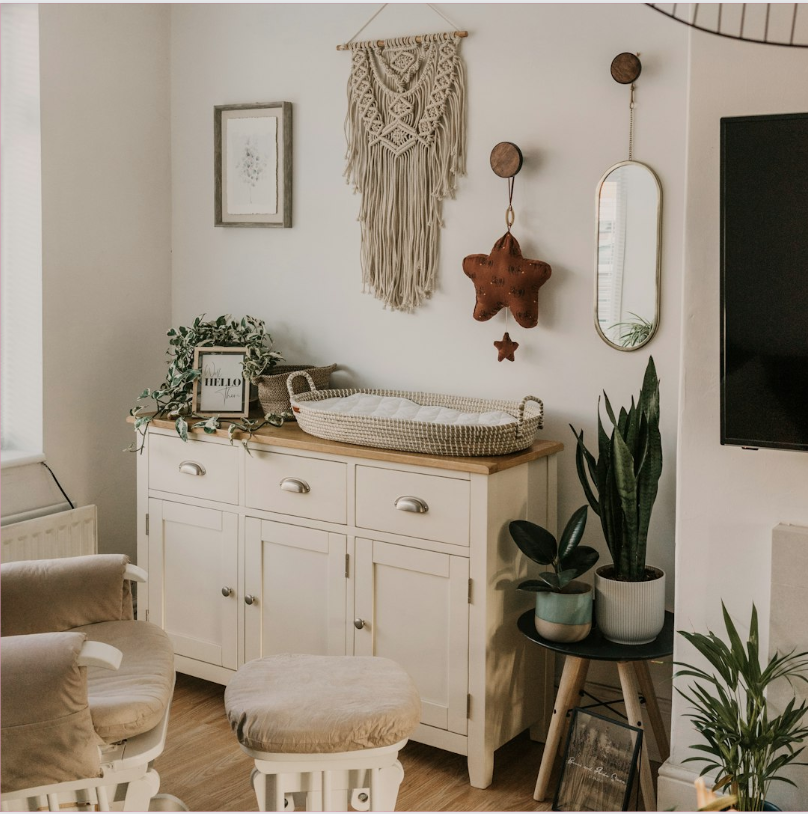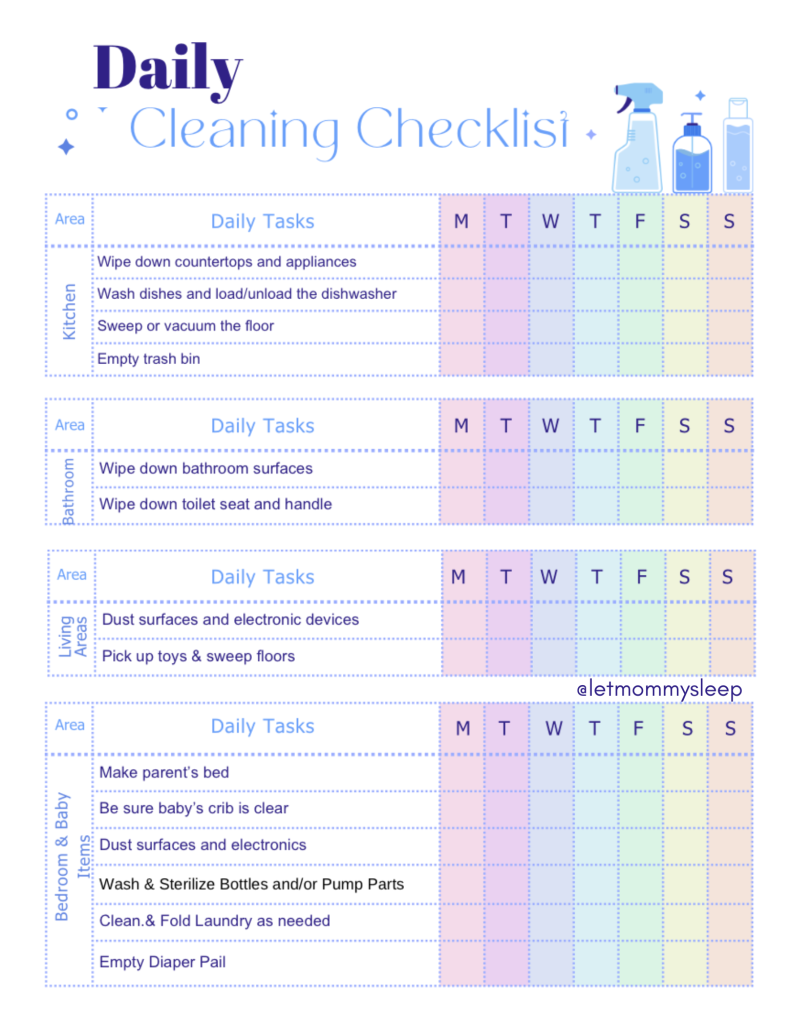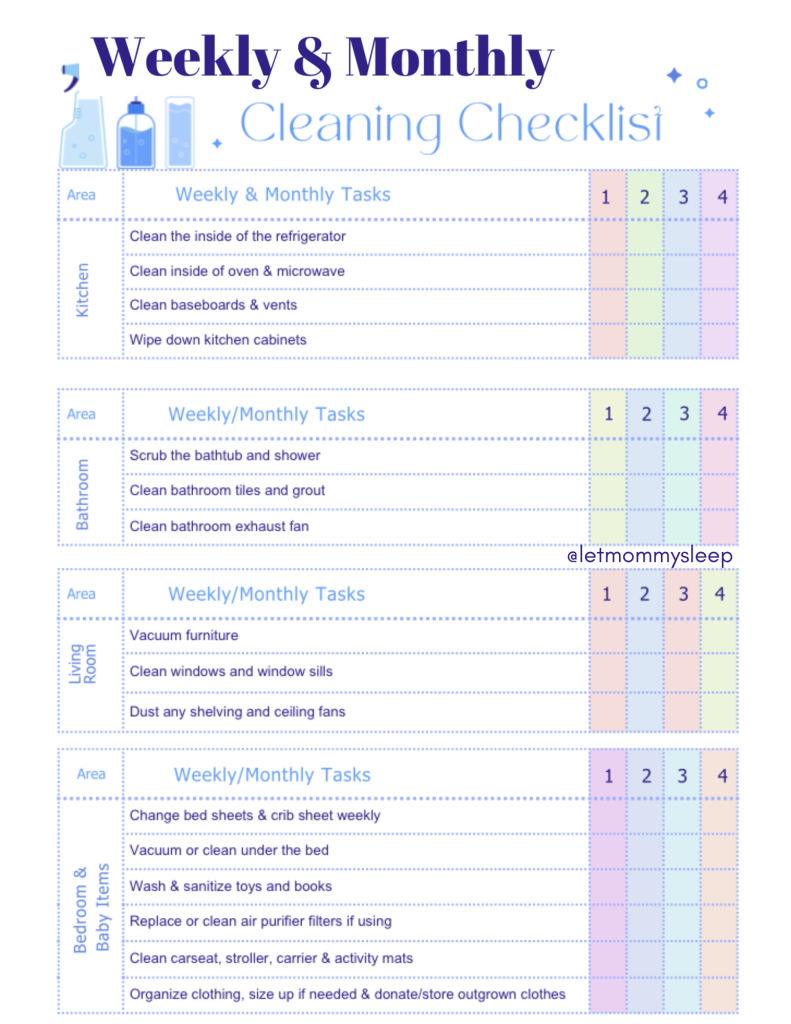Essential Guide: How To Prepare Your Home for a Newborn
Essential Guide: How To Prepare Your Home for a Newborn shares our postpartum doula and night nannies best tips for home organization. Preparing the home for your newborn or twins’ arrival helps you to concentrate on enjoying your new family.

How To Prepare Your Home for a Newborn – “Where will the baby ‘live’?”
One of the first questions to think about when preparing a home for a newborn is Where will the baby “live”? and by this we mean, where will the newborn sleep, have diaper changes and interact with the family for at least the first 6 months?
American Academy of Pediatrics safe sleep recommendations state that for at least the first 6 months, infants should sleep in the same room (but not the same bed) as parents/primary caregivers. So, a crib or bassinet and diaper changing station should be set-up in your bedroom or where you sleep. If the home and finances allow, create a second space for your newborn in the main living area of the home. This limits having to carry and move the crib, diapers, changing products etc. each day and night.
Our night doulas have collectively supported hundreds of families in their first weeks home and the set-up that tends to work best is to have a pack and play in the living room next to the kitchen. This way we can do all the bottle feeding prep and clean-up, pump cleaning, handwashing and more while having a safe sleep spot for baby close by.
In addition to home set-up, nursery prep should also happen before your newborn arrives. You want to be sure to leave plenty of time to allow the crib mattress to air out, childproof windows and ensure your baby’s room is safe sand secure. You can find the nursery checklist in Creating a Safe Nursery for Baby
Creating a Safe and Functional Baby Station
Diapering Station: Set up a well-stocked diaper changing station that includes: diapers, wipes, creams, and a changing pad. These items can be organized in a caddy, a changing table or drawer for easy access. Remember that any diaper changing furniture and all other furniture, should be anchored to the wall before baby arrives.
- In the first 2 weeks home a newborn will go through about 140 diapers. Average diaper changes are 8-12 per day so using 10 as an average, we can expect to go through 140. Remember to double this amount if expecting twins! Have boxes accessible and open.
- Be ready by having a box of the next size diaper on hand as your baby grows.
- To eliminate wasting any smaller size diapers, you can purchase “booster pads” which are pads that can be placed in a smaller size diaper to absorb excess liquid or temporarily use cloth diaper inserts.
- Keep clothing close by the diaper station for quick clothing changes. We recommend 2 to 3 zipper onesies as emergency clothing!
Disposing of diapers: Where will the wet/soiled diapers go? Get a diaper pail or small bags that the diaper can be placed in and then tied up to eliminate odors and germs before they’re disposed of outside.
If the family is cloth diapering, create a plan of where the used diapers and covers will go after use.

Stocking the Feeding Area
If you’re breastfeeding, have a comfortable chair with a side table for water and snacks, plus a breast pump if using. A nursing pillow should be accessible.
In addition to the pump, properly sized flanges should be available as well as milk storage bags and labels if using.
For bottle-feeding, be sure there are properly sized bottles and nipples. You can expect 6-8 feeds per day for a healthy full-term infant so if possible, a minimum of 8 bottles should be purchased to be sure you don’t have to clean and sterilize bottles more than 1 time per day.
Newborns will all use the slowest flow nipples but parents should be prepared with the next size nipple for when baby is ready to take in more milk per sip. There is no set timeline for this and the child’s pediatrician will be able to direct parents on when it’s appropriate to “size up” on nipple flow. Either way, be prepared to respond to baby’s needs with a higher flow nipple.
Formula brand and type might be determined by what the newborn was given in the hospital or by what the pediatrician recommends in the first well visit. While it is good to have a newborn “ready-to-feed” formula at home, parents might want to wait to stock up on their preferred formula until baby arrives and the pediatrician can give a clear recommendation on the best brand and type for the newborn. Essential Guide to Baby Bottles has you covered on the many types of bottles out there.
Clothing
Use clear bins or a dresser (anchored to the wall!) for baby clothes, sorted by size or type. This makes it easy to find what you need as your baby grows.
We recommend 10-12 zippered one piece pajamas and outfits in addition to whatever clothing the parents like. The zippered onesie allows for easy diaper and outfit changes and is the most versatile for safe sleep and comfort.
Simplifying Daily Routines
Keeping the household running while a newborn is in the home is a challenge. Add in older siblings, or possible work or volunteer obligations and daily routines can become overwhelming. Postpartum doulas can help by keeping daily routines simple. Here are some ways to do that:
Laundry: Have a dedicated laundry basket for baby clothes and a separate one for your own. Baby clothes are often washed in more gentle cleansers and are washed much more frequently. Those little pieces of clothing can also easily get lost in with the rest of the family’s pile!
Purchase and open baby’s laundry detergent before the due date.
Meal Prep: Prepare and freeze favorite meals in advance. Stock up on quick, nutritious snacks and easy-to-prepare meals for busy days. Think about fruits, smoothies, granola bars and other easy to store snacks. You can eat these on the go, or with one hand.
Consider using slow-cooker or one-pot recipes to save effort during preparation and don’t forget breakfast! Here are our night doulas favorite 7 Power Breakfasts for New Parents.
Minimize outside obligations
Ensuring that you have minimal commitments and a short to-do list means a calmer household, less chance of emergencies and more quality time for the family.
Here are some ways you can minimize commitments during the postpartum phase:
- Set Boundaries with Visitors: Decide in advance when and how you’ll welcome visitors. Are “pop-ins” okay? Create guidelines that prioritize your family’s well-being and let friends and family know what times are best for you. Consider using a shared online calendar to coordinate visits.
- to ensure they receive care and attention.
- Arrange for Help: Schedule times for family or friends to help with specific tasks like meal delivery, caring for older children or running errands. Consider creating a meal train or asking for help with grocery shopping.
- If Hiring Help is possible, schedule babysitters or a cleaning service as needed. Be prepared with their contact information before baby arrives.
- Limit Appointments and Commitments: Try to handle routine appointments (e.g., dentist, car maintenance, medical check-ups) before the baby arrives. Avoid committing to non-essential social events or meetings in the first few months.
- Set Up Online Bill Payments: Automate your bill payments to minimize the need to manage finances during the busy postpartum period.
- Cancel or Pause Memberships: Consider pausing or canceling memberships or subscriptions that you may not use during the newborn phase (e.g., gym memberships, social groups).
Cleaning & Disinfecting Viruses
Regular cleaning and disinfecting helps keep the home clean of course! However, during the winter months or even after the family has had guests or been exposed to large groups, a deep cleaning is helpful to keep bacteria and germs away from vulnerable newborns. In fact, keeping parents and adults healthy is vital too! Commercial wipes and cleaners kill most germs but not the category of viruses called non-enveloped viruses. To disinfect surfaces properly, a combination of bleach and water needs to be used.
Norovirus and rotavirus (2 of the awful stomach viruses) are not killed by commercial products like Clorox wipes. But you can disinfect using bleach. You may have seen recommendations to use 5 to 25 tablespoons of bleach in 1 gallon of water to create a disinfectant. This is a crazy wide range so it’s important to know that the amount of bleach used depends on what type of bleach you have. The label will tell you which you have.
In general you can use the amounts below but follow manufacturer instructions when using bleach or other disinfectants to ensure safe concentrations.
- Regular Bleach = 21-22 Tbls to 1 gallon of water
- Concentrated Bleach = 15-16 Tbls to 1 gallon of water
When using a bleach solution, clean the surface as you normally would first, keep the area ventilated, ensure the surface stays wet with the bleach solution for at least 5 minutes and never use bleach around your baby until fumes have cleared.
How To Prepare Your Home for a Newborn – Routine Cleaning and Disinfecting
Here are other must-do actions to keep germs away:
- Handwashing- sanitizers are about 70% effective (and also do not work to prevent stomach bugs) but handwashing is in the 90% range of effectiveness in killing germs.
- Opening windows – Fresh air and improved ventilation helps dilute airborne viruses, bacteria, and other contaminants by promoting air circulation.
- Use a HEPA Filter if you can: HEPA air filters capture airborne particles, including allergens and viruses.
- Don’t forget to Clean Electronics Regularly: Wipe down phones, tablets, and laptops with disinfecting wipes to prevent germs from accumulating.
- Use Microfiber Cloths: These trap dust, dirt, and bacteria more effectively then traditional cleaning cloths.
- Clean Your Water Bottles: Disinfect reusable water bottles regularly to avoid bacterial growth. Night Nurse tip: fill the bottle with water and drop a denture cleaner tab in it to soak overnight. Rinse well and it’s ready to go.
- Vacuum Often: Vacuum frequently to remove dust, pet dander, and allergens.


Visitors and Boundaries
Part of keeping germs and contagious illnesses away is ensuring that visitors are healthy and practicing good hand hygiene
Create a Cleaning Routine
Establishing a cleaning routine can be helpful so that you know what needs to be done each day, week or month. This helps the home run smoothly but has an added benefit of giving volunteers a to-do list if they want to help. When well-meaning loved ones ask “What can I do?” just hand them one of our checklists! However, be very gentle with yourself; if you have a choice between cleaning and sleep, please choose sleep. ❤️
Are you expecting? Visit Your First Week Home with Baby: Ultimate Q&A for more helpful info!
Categories
- Corporate Care & Partners
- COVID19 Archive
- En Espanol
- Expert Guides
- Hiring a Night Nanny
- Infant Safety
- Infant Sleep Hub
- Newborn Care
- Postpartum Health
- Twins & Multiples
- Work as a Night Doula
- zPost Archives
